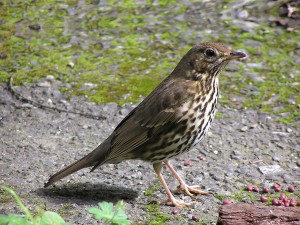The song thrush (Turdus philomelos) is one of my favourite songbirds. The song of the male is so beautiful. Song thrushes live in the UK year-round, and one of the special seasonal markers for us is that first day in early spring when the male starts singing from the top of one of the tall trees near our cottage. He is always the first to start the dawn chorus each morning—the blackbirds follow, but for a time his is the only voice in the pre-dawn gloom. It’s a lovely way to wake up.
The males stop singing later in the summer—maybe it’s to do with having established their territory and bred successfully. I miss their song when it stops, and so it’s always such a delight when, in the cold grey days of November, for some reason they start up again. A male has been singing his heart out around us for the last fortnight or so. His favourite perch is an ash tree in next door’s garden. It’s wonderful to hear. His song isn’t as full as in the spring, but it is still a thing of beauty.
I love the way thrushes repeat phrases as they sing. The ones around us seem to prefer three repetitions per phrase: I wonder if this is a regional thing? Elsewhere I have read of twice-repetitions being the norm.
(Even though we have two native thrush species, the song thrush and the mistle thrush (Turdus viscivorus) here in the UK, the song thrush is just the ‘thrush’ to me and many others, as mistle thrushes are so rarely seen. I have seen one once in the 22 years I have been living in our village.)
When Chap and I were on holiday in New Zealand we were fascinated to learn that many British birds had been introduced to the country in the Victorian period—the settlers were homesick, I guess. Even though thrushes are now struggling in the UK and are a Red List endangered species here, they are thriving in New Zealand. We were delighted at several camp sites to find the thrushes so tame that they would hop around our feet and feed on the chopped dried fruit (apricots and mangoes) we put down for them. We were also saddened to hear at one vineyard that the thrushes are such a threat to the grape harvest that the vineyard owner shot them as pests.
